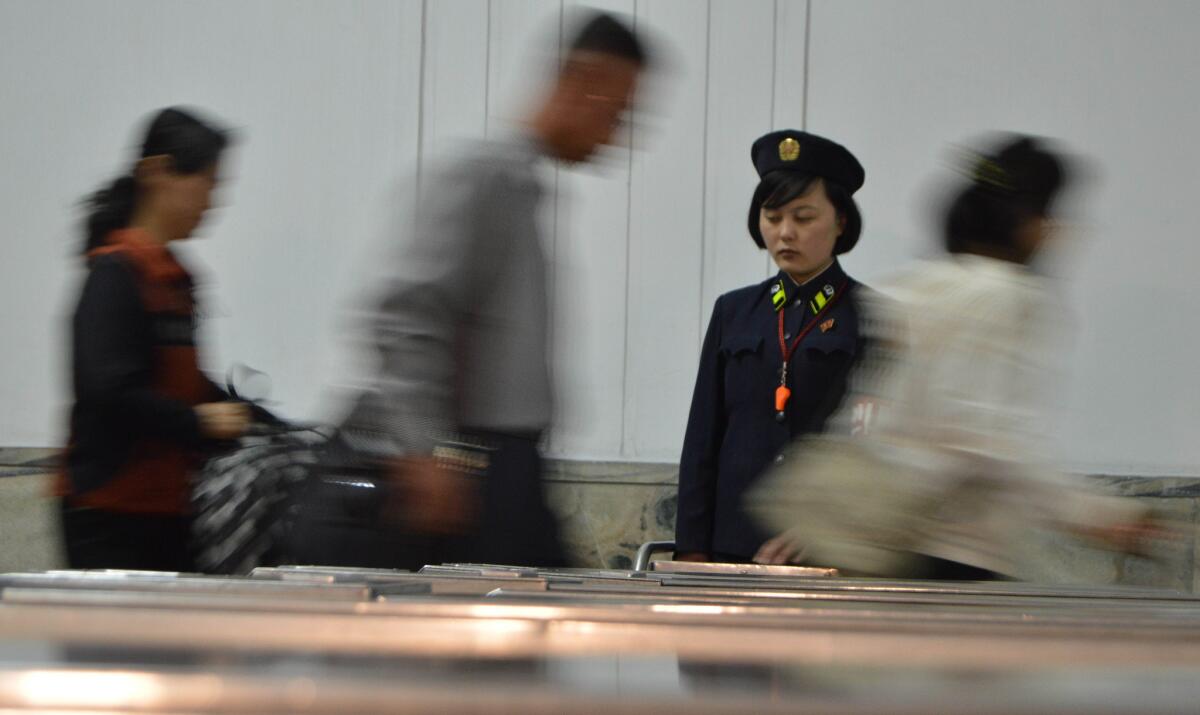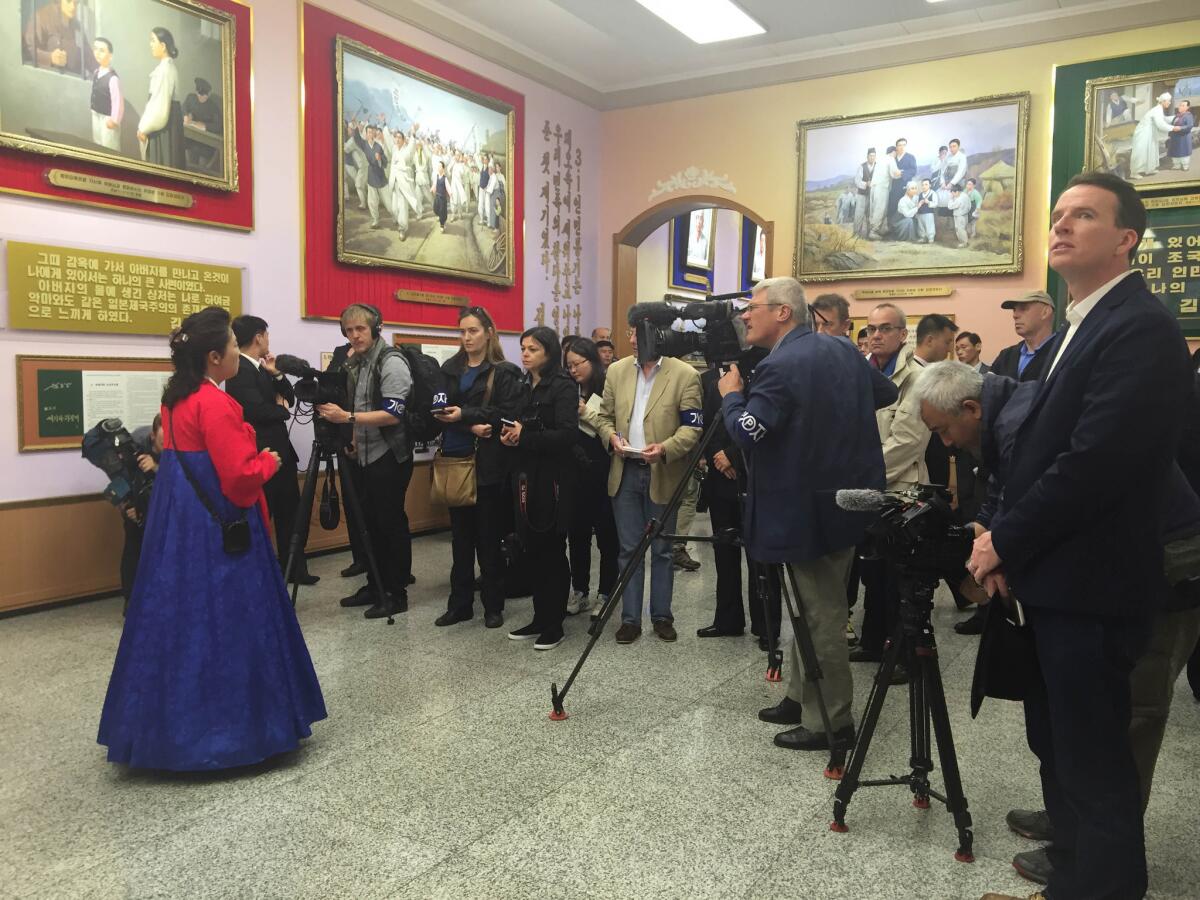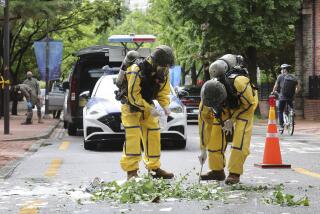In North Korea and trapped in a real-life version of ‘Waiting for Godot’

Commuters hurry through a subway station in Pyongyang, North Korea.
Reporting from PYONGYANG, North Korea — Is what I’m experiencing some real-life version of “Waiting for Godot”? Or perhaps it’s more like “One Flew Over the Cuckoo’s Nest.”
Five days into an 11-day, highly controlled reporting trip in North Korea with scores of other foreign reporters, I’m starting to contemplate the boundary between absurdity and insanity — and question which side of the line I’m on.
There has been lots of waiting, with what some would say is very little reward. We have all, ostensibly, descended upon Pyongyang because Kim Jong Un, the young leader of this secretive, nuclear-armed state, has called the highest-level political gathering in 36 years.
See more of our top stories on Facebook >>
Even though North Korea watchers overseas caution that the Seventh Workers’ Party Congress is unlikely to produce any sudden policy shifts, Kim is the kind of chieftain who kicks back with Dennis Rodman, builds dolphinariums and ski resorts, had his uncle executed and maybe, just maybe, ordered Sony hacked over the film “The Interview.” This year alone, he’s tested an H-bomb and a bunch of missiles, and launched a satellite into low-Earth orbit.
Things could get interesting. No one wants to miss out.

Foreign journalists souround a tour guide at Kim Il Sung’s birthplace museum.
But when the congress opened Friday, foreign journalists were allowed to get only as close as an intersection in front of the massive hall where the delegates convened. We were kept even further at bay Saturday.
No one seems to know when the event will end, or even whether we will get to witness any of the pomp and circumstance first-hand. Instead, we’ve been relegated to waiting for late-night broadcasts on state-run TV, which has aired somewhat mind-blowing — some would say frightening — footage of 5,000 delegates and observers madly clapping for Kim and bellowing throaty roars like soccer fans at the World Cup.
But as we pass the halfway point in our stay (the government has granted us 11-day visas), we inmates are getting a bit restless in the asylum.
Signs that the breaking point is nigh started to appear Saturday morning. After convening in the hotel lobby at 9:30 a.m., we were told the day’s program would not include any congress-related events. Instead, we could visit a museum marking the birthplace of North Korea’s founding father, Kim Il Sung, see a maternity hospital, ride one stop on Pyongyang’s subway and have a look around a newly built residential district for professors and scientists called Future Science Street.
Full coverage: Inside North Korea
Each journalist — be they a writer, on-camera reporter, producer, photographer or cameraman — is assigned a personal government minder/interpreter. Officials from the government’s “information committee” are setting our schedules, and often inform us only an hour ahead of time where the bus will go.
They do accommodate small requests. I, for instance, asked whether I could take a ride in a taxi and interview the driver and was allowed to do so. While anywhere else in the world interviewing a taxi driver constitutes Exhibit A of lazy journalism, in Pyongyang, it’s a small blow for freedom of the press.
Overall, though, the schedule is intended to ensure that we see only what North Korean leaders think is good about their country. And if anyone contemplates wandering off the approved track, there’s this to consider: Several Americans who were detained, tried and sentenced in North Korea in recent years have reported that they were held captive in the very hotel where we are currently staying.
Among us hacks, there are occasional, half-serious suggestions for minor uprisings. What if we all demanded to go not just one stop, but two stops on the subway? Would we then discover that it’s really just a two-stop loop and not the 17-station system the map says it is? What if we staged a sit-in in the hotel lobby and vowed not to budge until they took us to see the Yongbyon nuclear complex?
But no one wants to go to prison — or be told they can’t come back and report here ever again.
And so the choices for the daily reporting excursions are go, or not go. Most of us go everywhere — in part because some of us have never been here before and even a Potemkin factory is interesting the first time you see it. Those of us who have been here before go, too, even if we may have been to the factory in the past. You never know, something interesting might happen along the way, something unexpected, something unscripted.
Something real.
One journalist who has been to North Korea five times since 2008 said he thought this visit had in fact been the most loosely controlled of all his trips.
NEWSLETTER: Get the day’s top headlines from Times Editor Davan Maharaj >>
Last fall, he and his team were even forbidden to interview North Koreans watching a dolphin show. This time, reporters have been given multiple opportunities to do man-on-the-street interviews.
There have been other unexpected encounters. I was surprised to find that I was allowed to change money into North Korean won at the unofficial exchange rate of 8,000 to $1, and then spend that money at a snack kiosk on the street — something that was impossible on my last visit in 2008.
Of course, the question remains whether the people on the street are all “plants” who have been dispatched to the area with marching orders about how to interact with the foreigners.
I can’t rule out the possibility. A number of my interviewees have replied to my queries with nothing but verbatim propaganda lines; others have frozen up when I’ve asked such simple questions as, “What are you going shopping for?” or “What do you do for fun?” While touring the subway, some reporters believed they saw the same people repeatedly circulating in the station.
But even if Kim’s regime has the capacity to go full “Truman Show” — and I don’t think it does — it doesn’t need to stage everything to get people to stay on script.
Expatriates who have defected say the extreme social controls employed by Kim’s regime make North Koreans very careful even when talking among themselves. Knowing that one’s entire family could be punished if one speaks out of school is a powerful deterrent against any wayward comments.
The stage-managing can wear on a journalist’s nerves, and the inability to interview anyone with real power in the North Korean system can be maddening. TV reporters in particular face enormous pressure to deliver footage that raises the tough and important questions about human rights, food scarcity and nuclear weapons in North Korea.
Denied access to those with their hands on the levers of power, we sometimes resort to tossing such queries at even the most nominal of regime “representatives.”
On Saturday morning, I witnessed a pack of journalists encircle a tour guide in a long, flowing dress at Kim Il Sung’s birthplace museum shortly after she had finished describing some farm implements and storage jars supposedly used by the great helmsman’s family in the early 1900s.
“Wouldn’t it be better if you could choose your own government?” one demanded in an almost accusatory tone. Minutes later, another pressed her on why the state would pursue nuclear weapons when food security remains a critical issue. “Doesn’t that take resources away from ordinary people’s needs?”
Clearly this woman has neither policymaking power nor any say in who runs North Korea. Even if this woman, in her heart of hearts, yearns to choose her own leaders and is disgusted by the diversion of scarce national revenues toward bombs instead of bread, wouldn’t declaring so to a pack of foreign journalists with tape rolling be tantamount to suicide? Is it ethical to even put her in that position?
Where absurdity meets insanity, humanity can be swallowed up. I hope Godot gets here soon.
For more news from inside North Korea, follow @JulieMakLAT on Twitter.
ALSO
In the Philippines, the Marcos name is back, even as memories of the dictator have faded
19-year-old Hong Kong activist Joshua Wong, three others face trial for actions at protest
Inside North Korea’s Children’s Palace, a reporter finds children turning into robotic grown-ups
More to Read
Sign up for Essential California
The most important California stories and recommendations in your inbox every morning.
You may occasionally receive promotional content from the Los Angeles Times.










